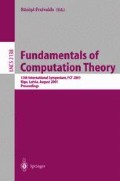Abstract
In this paper we introduce a model of a Quantum Branching Program (QBP) and study its computational power. We define several natural restrictions of a general QBP model, such as a read-once and a read-k-times QBP, noting that obliviousness is inherent in a quantum nature of such programs.
In particular we show that any Boolean function can be computed deterministically (exactly) by a read-once QBP in width O(2n), contrary to the analogous situation for quantum finite automata. Further we display certain symmetric Boolean function which is computable by a read-once QBP with O(logn) width, which requires a width Ω(n) on any deterministic read-once BP and (classical) randomized read-once BP with permanent transitions in each levels.
We present a general lower bound for the width of read-once QBPs, showing that the upper bound for the considered symmetric function is almost tight.
Supported by Russia Fund for Basic Research 99-01-00163 and Fund “Russia Universities” 04.01.52. Research partially done while visiting Dept. of Computer Science, University of Bonn.
Supported by Russia Fund for Basic Research 99-01-00163 and Fund “Russia Universities” 04.01.52.
Supported in part by DFG grants, DIMACS, and IST grant 14036 (RAND-APX).
Access this chapter
Tax calculation will be finalised at checkout
Purchases are for personal use only
Preview
Unable to display preview. Download preview PDF.
References
F. Ablayev and M. Karpinski, On the power of randomized branching programs, Electronic Colloquium in Computational Complexity, ECCC TR98-004, (1998), available at http://www.eccc.uni-trier.de/eccc/, also appeared in Proc. 28th ICALP (1996), LNCS Vol. 1099, Springer, 1996, 348–356.
F. Ablayev and M. Karpinski, A Lower Bound for Integer Multiplication on Randomized Read-Once Branching Programs, ECCC TR98-011 (1998), available at http://www.eccc.uni-trier.de/eccc/.
P. Alexandrov, Introduction to set theory and general topology, Berlin, 1984.
A. Ambainis and R. Freivalds, 1-way quantum finite automata: strengths, weaknesses and generalization, In Proceeding of the 39th IEEE Conference on Foundation of Computer Science, 1998, 332–342. See also quant-ph/9802062 v3.
D. Barrington, Bounded-width Polynomial-Size Branching Programs Recognize Exactly Those Languages in NC 1, Journal of Comp. and System Sci. 38, (1989), 150–164.
A. Brodsky and N. Pippenger. Characterization of 1-way quantum finite automata. quant-ph/9903014, available at http://xxx.lanl.gov/archive/quant-ph. See also its Russian mirror: http://xxx.itep.ru.
R. Feynman, Simulation Physics with Computers, International Journal of Theoretical Physics, (1982), 21, 467.
R. Freivalds, Quantum finite automata, Manuscript 2000, personal communication.
A. Kondacs and J. Watrous. On the power of quantum finite state automata. In proceedings of the 38th Annual Symposium on Foundations of Computer Science, 1997, 66–75.
P. Shor, Polynomial-time algorithms for prime factorization and discrete logarithms on a quantum computer, SIAM J. on Computing, 26(5), (1997), 1484–1509.
Author information
Authors and Affiliations
Editor information
Editors and Affiliations
Rights and permissions
Copyright information
© 2001 Springer-Verlag Berlin Heidelberg
About this paper
Cite this paper
Ablayev, F., Gainutdinova, A., Karpinski, M. (2001). On Computational Power of Quantum Branching Programs. In: Freivalds, R. (eds) Fundamentals of Computation Theory. FCT 2001. Lecture Notes in Computer Science, vol 2138. Springer, Berlin, Heidelberg. https://doi.org/10.1007/3-540-44669-9_8
Download citation
DOI: https://doi.org/10.1007/3-540-44669-9_8
Published:
Publisher Name: Springer, Berlin, Heidelberg
Print ISBN: 978-3-540-42487-1
Online ISBN: 978-3-540-44669-9
eBook Packages: Springer Book Archive

